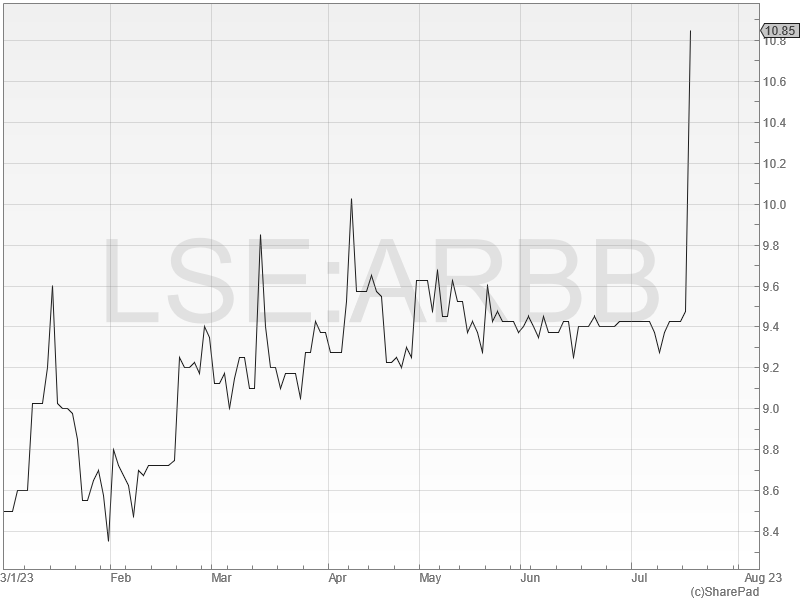Dividend notes: 3 owner-led dividend stocks - IHP, LUCE, ARBB (18/07/23)
In today's founder-themed notes, I look at updates from investment platform IntegraFin and electrical parts supplier Luceco. I also consider impressive half-year results from private bank Arbuthnot -- is this owner-managed business a potential dividend sleeper?

Welcome back to my dividend notes. All three of the companies I'm looking at today have some level of owner management. This is an attribute I have placed growing importance on over the years.
Perhaps not coincidentally, I'm encouraged by all three of today's updates.
Companies covered:
- IntegraFin (LON:IHP) - another quarter of net inflows for this investment platform confirms its appeal to financial advisers. I remain a fan of this business.
- Luceco (LON:LUCE) - a solid half-year update that suggests full-year results could be slightly better than previously expected. I like some aspects of this business, but have reservations about some recent growth.
- Arbuthnot Banking (ARBB) - this private bank has delivered a very strong set of half-year results, powered by rising interest income. I think the shares could offer value for long-term investors, even after today's gains.
These notes contain a review of my thoughts on recent results from UK dividend shares in my investable universe. In general, these are dividend shares that may appear in my screening results at some point.
As always, my comments represent my views and are provided solely for information and education purposes. They are not advice or recommendations.
IntegraFin (IHP)
"Robust flows to the Transact platform during Q3 FY23, with net inflows of over £0.6bn"
Investment platform IntegraFin offers similar functionality to AJ Bell and Hargreaves Lansdown, but is designed specifically for financial advisers.
Founder Michael Howard remains on the board of this FTSE 250 business, which was the subject of a podcast I recorded recently with my friend and fellow private investor Maynard Paton.
I hadn't previouly looked at IntegraFin in much detail, but I was impressed with the business. I could see myself owning this stock at some point.
Q3 update: IntegraFin saw net inflows of £0.6bn in client funds under direction (FUD) during the three months to 30 June. Daily average FUD during the quarter was £54.3bn, higher than the £53.2bn achieved for the year to date.
This result maintains IntegraFin's record of net inflows every quarter for the last six years. An impressive feat, I think, which seems to highlight the appeal of the business to advisers and their clients.
The number of advisers signed up to IntegraFin's Transact platform was unchanged at 7,606 at the end of June. Chief executive Alex Scott says that client retention remained strong, at 96% on an annualised basis.
Outlook: CEO Scott admits the outlook remains uncertain but expects to maintain the group's record of net inflows for the year ending 30 September.
Broker forecasts show modest profit growth this year, pricing the stock on 18x forecast earnings, with a 4% dividend yield. For a business with c.40% operating margins, this doesn't seem unreasonable to me.
CFO apppointment: one of the few criticisms Maynard and I made of this business was its puzzling lack of a CFO. We felt this may have led to some accounting glitches in the past.
IntegraFin has now addressed this shortcoming with the recent appointment of Euan Marshall as chief financial officer. Marshall will join from financial trading firm CMC Markets, where he's currently CFO. This looks like a solid hire to me.
My view: I can't see much to dislike in IntegraFin's Q3 update. Its large share of the independent financial adviser market means that further growth in the adviser count may be slower. But as Maynard explained in the podcast, existing many existing advisers still have plenty of client assets they can bring on board.
IntegraFin's unbroken record of net inflows speaks to the appeal of the business to advisers, in my view. I the stock is probably fairly valued at current levels and will continue to watch with interest.
Luceco (LUCE)
"Full year guidance towards the upper end of market expectations."
Luceco manufactures and supplies a wide range of wiring products, LED lighting and EV charging accessories. Chief executive John Hornby has an 18% shareholding, providing a reassuring level of skin in the game.
Coincidentally, Luceco is another stock I discussed in more depth in a podcast recently – click here for more details (free to listen).
H1 update: this business has been buffetted by customer destocking in recent months, but Luceco believes this process has now come to an end.
The company says that revenue for the half year to 30 June was "ahead of expectations" at £101m, albeit still 5% below last year's level.
Gross margins are said to be improving. Adjusted operating profit for the half year is expected to be £10.5m, ahead of expectations.
Net debt of 1.3x EBITDA looks acceptable to me and cash generation is expected to improve as inventory levels fall.
Non-residential demand is said to be strong, but sadly Luceco did not provide any comment on the performance of its individual operation divisions in this update. As we discussed in the podcast, there are big differences in profitability between the core wiring business and the other two divisions.
Outlook: activity levels are said to be supported by "a strong Q3 order book". Adjusted operating profit for the full year is now expected to be "towards the upper end of the range of current market expectations".
According to figures provided by the company, this suggests a profit figure between £20m and £22m, approximately.
Broker forecasts suggest adjusted earnings of 9.2p per share, with a 4.3p dividend. That prices the stock on 13x forecast earnings, with a 3.7% dividend yield.
My view: I remain neutral on this business. I think Luceco has some attractive qualities, but I'm not convinced that some of the group's more recently acquired operations are really creating much value for shareholders.
Even so, I think the valuation looks reasonable at the moment.
Arbuthnot Banking (ARBB)
"The Group continues to benefit from the business model it has established over many years"
Arbuthnot Banking is the holding company for the Arbuthnot Latham private bank. This was founded in 1833 and offers private banking, wealth management, commercial banking, and specialist lending.
Looking at the website, the bank's lending seems to be focused on property, asset finance, and business loans, in particular for UK media productions.
Shares in this £150m AIM-listed firm rose sharply after these half-year results were published:

This business is led by chairman and chief executive Sir Henry Angest, who also has a 56% shareholding. So we might argue that it's a private bank in more ways than one! Certainly, liquidity is limited, with a chunky spread and fairly low trading volumes.
I don't know much about Arbuthnot, but my previous impressions have been fairly positive. Today's half-year results reinforce that view.
Financial highlights: rising interest rates have provided a boost to profits, generating "increased revenue on both ... lending and excess liquidity".
Underlying pre-tax profit for the half year to 30 June was £29.3m, nearly triple the £10.7m earned in H1 last year. This increase appears to have been driven almost entirely by the impact of higher interest income, which doubled from £50m to £100m for the half year.
This increase offset rising interest expenses and higher operating costs, leaving a substantially increased surplus.
This increased profit was reflected in Arbuthnot's CET1 ratio, which rose slightly to 12.2% (FY22: 11.6%). This increase in surplus capital should provide comfortable support for an increased interim dividend of 19p per share (H1 2022: 17p).
My sums suggest Arbuthnot has generated a return on equity of 15% over the last 12 months, which looks very respectable to me.
Net assets per share were 1,470p at the end of the half year, up from 1,411p at the end of December 2022. The stock is trading at about 1,100p as I write. This means that the shares are still trading 25% below book value, even after today's gains.
Operational highlights: lending rose 9.5% to £2.3bn during the half year, despite "a tighter credit appetite".
Customer deposits also rose to £3.3bn, from £3.1bn at the end of 2022.
Assets under management by Arbuthnot's wealth division were £1.4bn at the end of June, compared to £1.3bn at the end of June 2022 and December 2022. Management says this was driven by net inflows.
Outlook: The benefit from rising interest rates is expected to be lower during the second half of the year, as older fixed-term deposits roll off and are renewed at higher interest rates. This is expected to reduce the bank's net interest margins.
Helpfully, the bank provides some numerical guidance for us. The average cost of deposits was said to be 1.9% during the first half of the year and 2.2% in June alone.
If interest rates remain stable at current levels for the next 12-18 months, Arbuthnot would expect its cost of deposits to rise to 2.9%. This reflects the mix of current accounts (lower rates) and term deposit banking (higher rates).
Angest acknowledges the uncertain economic conditions and potential increases in credit risk, but believes the bank remains "well positioned" for continued progress.
Broker forecasts prior to the results suggested that Arbuthnot's earnings per share would double to £2 this year. A dividend of 45p is expected.
These estimates price the stock on less than six times earnings, with a dividend yield of about 4%. When paired with a 25% discount to book value, this doesn't seem too demanding to me.
My view
I don't have any particular insight into the outlook for this business. But Arbuthnot's valuation looks very reasonable to me, based on its recent financial performance.
One potential area of concern for me is succession, given that the chairman and chief executive is in his 80s and controls 56% of the stock. I don't know if the company has made any comment on this in the past, but it's something I'd try to find out a little more about.
On balance, my impression of this business remains very favourable. Prior to the pandemic, Arbuthnot had paid unbroken dividends for at least 28 years, according to SharePad. In this context, I think the 4% yield could be attractive.
I don't have room for another bank in my dividend portfolio at the moment. But this is certainly a business I'll keep an eye on.
Disclaimer: This is a personal blog/newsletter and I am not a financial adviser. All content is provided for information and educational purposes only. Nothing I say should be interpreted as investing advice or recommendations.
You should carry out your own research and make your own investing decisions. Investors who are not able to do this should seek qualified financial advice. Reasonable efforts are made to ensure that information provided is correct at the time of publication, but no guarantee is implied or provided. Information can change at any time and past articles are not updated.




